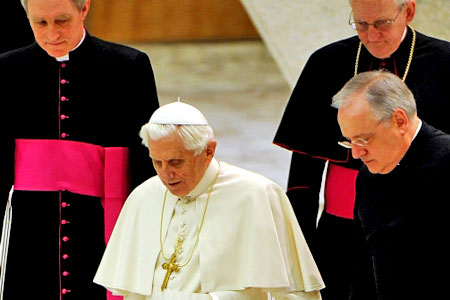|
from TheDailyBeast Website
Viganò had been making marked progress
in his battle against corruption and cronyism as deputy governor in
charge of financial reforms of Vatican City. But he was fiercely
disliked by a number of high-ranking cardinals, who were successful
in getting their nemesis moved out of Rome.
In one of the last letters he wrote before his transfer was final, he pleaded with the pope to let him stay.
He was moved anyway.
He cited one incident in which the Vatican is said to have lost $2.5 million by awarding a work contract to an unqualified firm that had ties to the Vatican’s internal bank, effectively, he said, a cover for a money-laundering scheme.
Alberto Pizzoli - AFP-Getty
Images More letters surfaced in mid-February in the muckraking daily newspaper Il Fatto Quotidiano, exposing a vast array of inner-Curia conflicts and the Vatican’s knowledge of an alleged plot to kill Pope Benedict XVI within a year.
These letters were written by Cardinal Paolo Romeo after a state visit to China in November, in which he discussed his worry about the pope’s safety. The Vatileaks scandal has exposed what appears to be fierce infighting within the Holy See.
With Pope Benedict XVI’s ailing health and last week’s consistory in which he named 22 new cardinals who will ultimately be part of the conclave that decides his successor, internal politics are certainly in play. But the leaks may be by design.
Some Vatican pundits have suggested that by exposing the alleged corruption, those who can then fix the problem by offering greater transparency may ultimately benefit when it comes time to vote for the next pope.
Another theory about what’s really behind the leaks is that by exposing the Vatican’s financial vulnerabilities now, the Vatican has a chance to tidy up the books and polish its reputation by June, when the European Commission will consider the Vatican’s inclusion on the “white list” of anti-terrorism financial entities that abide by the international rules of transparency.
This coveted honor is said to be a priority for the Holy See, which has for decades been plagued by rumors and allegations that it is a corruption-laden tax haven for a number of high-profile secret investors.
In some documents leaked
last week, revelations that the Vatican’s financial patrons may
include highly questionable clientele rocked Rome.
Some documents that have been exposed in recent weeks have also shown what appear to be moves to scupper efforts by Italy’s interim technocratic government under Mario Monti to get the church to pay property taxes.
The Vatican owns an estimated 20 percent of all real estate in Italy, and its tax bill is estimated to be about $100 million annually.
Property owned by the Catholic Church is
exempt from property taxes as long as the properties serve a
religious function. That means hotels, schools, and other church
property need only contain a chapel to be exempt from taxes.
An editorial in the Vatican’s newspaper, Osservatore Romano, said the pope wouldn’t be “stopped by these wolves” set to destroy the sanctity of the church’s highly guarded inner workings.
The Vatican’s official spokesman, Federico Lombardi, said the leaks were meant to discredit the church as a whole.
Now the question is whether Vatileaks
will lead to greater transparency or even more secrecy from one of
world’s most hallowed institutions.
|

